Fleurs du Mal Magazine


Or see the index
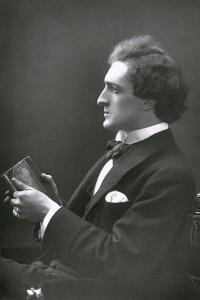
Her Portrait Immortal
Must I believe this beauty wholly gone
That in her picture here so deathless seems,
And must I henceforth speak of her as one
Tells of some face of legend or of dreams,
Still here and there remembered–scarce believed,
Or held the fancy of a heart bereaved.
So beautiful she–was; ah! “was,” say I,
Yet doubt her dead–I did not see her die.
Only by others borne across the sea
Came the incredible wild blasphemy
They called her death–as though it could be true
Of such an immortality as you!
True of these eyes that from her picture gaze,
Serene, star-steadfast, as the heaven’s own eyes;
Of that deep bosom, white as hawthorn sprays,
Where my world-weary head forever lies;
True of these quiet hands, so marble-cool,
Still on her lap as lilies on a pool.
Must I believe her dead–that this sweet clay,
That even from her picture breathes perfume,
Was carried on a fiery wind away,
Or foully locked in the worm-whispering tomb;
This casket rifled, ribald fingers thrust
‘Mid all her dainty treasure–is _this_ dust!
Once such a dewy marvel of a girl,
Warm as the sun, and ivory as the moon;
All gone of her, all lost–except this curl
Saved from her head one summer afternoon,
Tied with a little ribbon from her breast–
This only mine, and Death’s now all the rest.
Must I believe it true! Bid me not go
Where on her grave the English violets blow;
Nay, leave me–if a dream, indeed, it be–
Still in my dream that she is somewhere she,
Silent, as was her wont. It is a lie–
She is not dead–I did not see her die.
Richard Le Gallienne
(1866 – 1947)
Her Portrait Immortal
From: The lonely Dancer and other Poems, 1913
• fleursdumal.nl magazine
More in: Archive G-H, Archive G-H, Gallienne, Richard Le

VOORGEVOEL
H. Marsman
Hij met ontstekingen in de longen,
bloed en etter, blaffende dagen, wekenlang
in bed, in niet aflatende strijd.
En die andere hij, niet veel jonger, getroffen
door flitsen uit het schoolboek, in borst en maag
de dood in een schaars verlicht ruim.
Beiden ouder. Hij met de als kalmte
vermomde vrees dat een nacht op zee
daadwerkelijk het einde zou worden.
En hij afwisselend wetend en radend in besef
van een doffe plof, scheurend ijzer, geschreeuw.
Dan benamen donker en kou de adem,
nam de druk toe, knarste het schip,
schoof het zuchtend naar de bodem,
het zwart schuimende dal der Durance,
in een hart voorgoed doordrenkt van azuur.
Albert Hagenaars
Voorgevoel
H. Marsman
Gedicht
• Voorpublicatie uit de nieuwe bundel Pelgrimsgrond
• fleursdumal.nl magazine
More in: Archive G-H, Archive G-H, Hagenaars, Albert
Dichter Ingmar Heytze wordt door bezoekers van zijn optredens nog wel eens verward met een cabaretier of comedian. De belangrijkste reden daarvoor is dat hij niet alleen zijn gedichten en vertalingen geweldig voordraagt, maar er ook van alles bij vertelt ter inleiding, uitleiding of gewoon als aangenaam geouwehoer tussendoor.
 Heytze houdt zich daarbij ver van interpretatie van zijn eigen werk. Dat moet de lezer of luisteraar zelf maar doen: ‘Een gedicht is net een mop, als je hem moet uitleggen was het geen goede mop, en als hij wel goed was, is hij dat na uitleg zeker niet meer.’ Dat neemt niet weg dat hij in de inleidingen, die inderdaad wel iets weg hebben van miniconferences, veel van zijn poëzieopvattingen en werkwijze prijsgeeft. De goede verstaander kan er zonder veel moeite Heytzes poëtica uit destilleren. Dit zijn de honderd gedichten die iedereen van Heytze in de kast zou moeten hebben, voorzien van tekst en uitleg in de vorm van de anekdotes, verhalen, betogen en improvisaties waarmee hij furore maakte tijdens duizenden voordrachten in Nederland en België. Duik in het poëtisch universum van een van de vitaalste dichters van Nederland.
Heytze houdt zich daarbij ver van interpretatie van zijn eigen werk. Dat moet de lezer of luisteraar zelf maar doen: ‘Een gedicht is net een mop, als je hem moet uitleggen was het geen goede mop, en als hij wel goed was, is hij dat na uitleg zeker niet meer.’ Dat neemt niet weg dat hij in de inleidingen, die inderdaad wel iets weg hebben van miniconferences, veel van zijn poëzieopvattingen en werkwijze prijsgeeft. De goede verstaander kan er zonder veel moeite Heytzes poëtica uit destilleren. Dit zijn de honderd gedichten die iedereen van Heytze in de kast zou moeten hebben, voorzien van tekst en uitleg in de vorm van de anekdotes, verhalen, betogen en improvisaties waarmee hij furore maakte tijdens duizenden voordrachten in Nederland en België. Duik in het poëtisch universum van een van de vitaalste dichters van Nederland.
Ingmar Heytze (1970) publiceerde talloze dichtbundels, drie dagboeken en een bundel miniaturen. In 2008 ontving Heytze de C.C.S. Croneprijs voor zijn gehele oeuvre. In 2012 verscheen zijn bundel Ademhalen onder de maan. Een jaar later verscheen Reisoefeningen, waarin Heytze verslag doet van zijn gevecht tegen reisangst, die hem vele jaren aan zijn woonplaats Utrecht kluisterde. Met Ademhalen onder de maan won Ingmar Heytze de Hugues C. Pernathprijs 2013. In 2015 verscheen De man die ophield te bestaan, over het vaderschap, en Utrecht voor beginners & gevorderden. In 2016 verscheen zijn verzamelbundel Voor de liefste onbekende, met daarin bijna al zijn gedichten (gepubliceerde én ongepubliceerde).
Ingmar Heytze: De honderd van Heytze
224 pagina’s
Omslag: Rouwhorst + Van Roon
ISBN: 9789463810678
Nur: 306
17×24 cm
€ 25,00
• fleursdumal.nl magazine
More in: Archive G-H, Archive G-H, Heytze, Ingmar
Net als de vorige dichtbundels van Albert Hagenaars kent Pelgrimsgrond een strakke thematische indeling. In zeven reeksen van elk zeven gedichten roept hij ditmaal herinneringen op aan momenten dat hij kort maar heftig of juist blijvend getroffen werd door poëzie, schilderijen, muziek en films, herbeleeft hij de glorie en teloorgang van de liefde en bezoekt hij plaatsen die niet alleen cultureel maar ook sacraal van betekenis zijn.
 De lezer komt in Pelgrimsgrond Charles Baudelaire en de Middeleeuwse mystica Hadewych tegen, beschouwt schilderijen van Edward Hopper, Edvard Munch en Egon Schiele, hoort muziek van Jacob Obrecht en Gustav Mahler, ziet films als Der Tod in Venedig en The crying game en doet bedevaartplaatsen aan in Cambodja, China, Litouwen, Noorwegen en Polen. Pelgrimsgrond verbindt hierbij telkens individuele gebeurtenissen met algemene, het verleden met het heden, onvermogen met prestatie, realiteit met verbeelding.
De lezer komt in Pelgrimsgrond Charles Baudelaire en de Middeleeuwse mystica Hadewych tegen, beschouwt schilderijen van Edward Hopper, Edvard Munch en Egon Schiele, hoort muziek van Jacob Obrecht en Gustav Mahler, ziet films als Der Tod in Venedig en The crying game en doet bedevaartplaatsen aan in Cambodja, China, Litouwen, Noorwegen en Polen. Pelgrimsgrond verbindt hierbij telkens individuele gebeurtenissen met algemene, het verleden met het heden, onvermogen met prestatie, realiteit met verbeelding.
Door alle gedichten heen klinken de bastonen van Hagenaars’ vertrouwde thema’s: levensdrang; erotiek en vruchtbaarheid; het belang van reizen en identiteit; de fascinatie voor de eindeloos uit te vouwen werkelijkheid.
Albert Hagenaars debuteerde in 1979 bij Poëzie-uitgeverij WEL met de bundel Stadskoorts. In deze uitgave treft de lezer al volop kenmerken van het latere werk aan. Inhoudelijk zijn dat onderwerpen als het reizen, vervreemding en identiteit. Formeel is er al een duidelijke tendens naar één, in cycli verdeeld geheel.
Zijn tweede bundel, Spertijd kent drie even grote delen met aandacht voor respectievelijk 1) portretten van Europese steden, 2) Parijs, waar de dichter inzoomt op fysieke aspecten zoals de metro en de RER, stations en pleinen, een rosse buurt, park, paleis, voorstad enzovoort en 3) het nachtleven op anoniem geworden plaatsen.
Ook de volgende bundels zijn ter wille van de helderheid strak thematisch geordend, het meest symbolisch in Tropendrift. Dit boek, dat in het NL en Engels tegelijk verscheen, volgt qua compositie zowel in traject als verblijfsduur een reis. Het is gewijd aan bezochte plaatsen in Zuidoost-Azië: Thailand, Maleisië & Singapore, Sumatra, Java , Bali , Singapore & Maleisië en opnieuw Thailand.
Later verscheen ook een volledig Indonesische versie, gemaakt door de bekende vertaler Landung Simatupang.
In Tropendrift speelt de geschiedenis een belangrijke rol, zowel op het algemene niveau van politiek, religie en oorlog, als op het persoonlijke van familiebetrekkingen en relaties tussen man en vrouw, tussen ouders en kinderen, tussen west en oost.
In Bloedkrans, bestaande uit 4 delen van elk 20 gedichten, brengt Albert Hagenaars vooral liefde, lust en dood samen. In dit boek, geschreven in het verhoopte midden van z’n eigen leven, koppelt de dichter herinneringen en eigen ervaringen aan wereldgebeurtenissen en omgekeerd. Nog nadrukkelijker dan voorheen richt hij zich hier op de thematiek van vruchtbaarheid. De drang tot overleven vormt voor elke cultuur in sterke mate de basis van het geloof.
De nieuwe, dit jaar te verschijnen bundel Pelgrimsgrond, bevat zeven reeksen van elk zeven gedichten, alle in het teken van de belangrijkste invloeden die Albert Hagenaars in zijn kunstenaarsleven heeft ondergaan.
I TE WOORD (over leven en werk van dichters)
II ONDER OGEN (over leven en werk van schilders)
III TUSSEN DE OREN (over leven en werk van componisten)
IV SNIJWERK (over specifiek genoemde films)
V BEKORING (over glorie en teloorgang van liefdes)
VI BEDEVAART (over bezochte pelgrimsoorden)
VII IDOLEN (over goden en godheden)
Het motto van dit boek is onderstaande haiku van Matsuo Kimera:
reizen naar schrijnen
die wachten op wie ze zelf
zal moeten vullen
• Albert Hagenaars (Bergen op Zoom, 1955) was aanvankelijk werkzaam als beeldend kunstenaar en galeriehouder. Hij studeerde Nederlands en bracht veel tijd in Frankrijk door. In 1980 koos hij voor de literatuur. Werk van zijn hand verscheen in talrijke bladen en bloemlezingen, waaronder Maatstaf, De Tweede Ronde, Literair Akkoord, Raster, Poëziekrant en ‘De Nederlandse poëzie van de negentiende en twintigste eeuw in 1000 en enige gedichten’. Behalve gedichten, romans en vertalingen schrijft hij ook kritieken over literatuur en moderne beeldende kunst voor tal van bladen. Hagenaars werkt vaak samen met kunstenaars en musici en ook met collega’s uit andere taalgebieden. Enkele van zijn boeken werden vertaald; in het Duits, Frans, Indonesisch en Roemeens. Enkele componisten maakten muziek bij werk van Albert Hagenaars. Hagenaars maakte veel reizen, door o.a. de Verenigde Staten, Latijns-Amerika en het Verre Oosten. De laatste jaren woont hij deels in Indonesië, het geboorteland van zijn vrouw, Siti Wahyuningsih, met wie hij al ruim 200 Nederlandstalige gedichten van bekende en onbekende auteurs in Bahasa Indonesia vertaalde en publiceerde. (www.alberthagenaars.nl)
# new poetry
Albert Hagenaars
Pelgrimsgrond
Gedichten
Uitgeverij In de Knipscheer
ISBN 978-94-93214-32-3
84 pagina’s
Prijs ca. € 17,50
Verschijnt September 2021
• fleursdumal.nl magazine
![]()
CRÉNOM
Charles Baudelaire
De plavuizen waren hard in de Saint-Loup
maar minder dan de hospitaalbedden die wachtten.
Al voor de val begon de glijvlucht in de afasie
op uiteindelijk dat ene woord na. Inniger
klampte hij zich daaraan vast dan aan de trouwe
hoer die het venijn om zijn jeugd heen schoof.
Alles nog weten, wensen te kunnen. Hij scherpte
z’n zinnen aan de krimpende ring van de spraak
waar hij ooit met pijnlijk geduld het ingesnoerde vel
van vermocht te tuchtigen tot schandaal en verbod.
Hij rook de wierook weer, mama, en werd jonger
dan in zijn oudste gedicht, waarde elke nacht
dagenlang tussen bezielde stammen rond, versloeg
als Lupus de draak die alle woorden verslond,
en kletste en zwetste, tierde als nooit tevoren,
kwam niet meer tot bedaren.
Albert Hagenaars
Uit: Pelgrimsgrond
• fleursdumal.nl magazine
More in: - Book News, - Bookstores, Archive G-H, Archive G-H, Baudelaire, Charles, Hagenaars, Albert
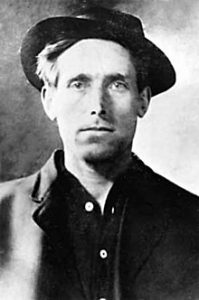
The Girl Question
A little girl was working in a big department store,
Her little wage for food was spent; her dress was old and tore.
She asked the foreman for a raise, so humbly and so shy,
And this is what the foreman did reply:
CHORUS:
Why don’t you get a beau?
Some nice old man, you know!
He’ll give you money if you treat him right.
If he has lots of gold,
Don’t mind if he is old.
Go! Get some nice old gentleman tonight.
The little girl then went to see the owner of the store,
She told the story that he’d heard so many times before.
The owner cried: “You are discharged! Oh, my, that big disgrace,
A ragged thing like you around my placel”
The little girl she said: “I know a man that can’t be wrong,
I’ll go and see the preacher in the church where I belong.”
She told him she was down and out and had no place to stay.
And this is what the holy man did say:
Next day while walking round she saw a sign inside a hall,
It read: THE ONE BIG UNION WILL GIVE LIBERTY TO ALL.
She said: I’ll join that union, and I’ll surely do my best,
And now she’s gaily singing with the rest:
FINAL CHORUS:
Oh, Workers do unite!
To crush the tyrant’s might,
The ONE BIG UNION BANNER IS UNFURLED —
Come slaves from every land,
Come join this fighting band,
It’s named INDUSTRIAL WORKERS OF THE WORLD .
Joe Hill
(1879-1915)
The Girl Question
(song)
• fleursdumal.nl magazine
More in: # Music Archive, Archive G-H, Joe Hill, Workers of the World
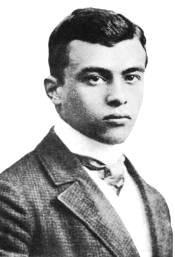
Die Stadt
Ich sah den Mond und des Ägäischen
Grausamen Meeres tausendfachen Pomp.
All meine Pfade rangen mit der Nacht.
Doch sieben Fackeln waren mein Geleit
Durch Wolken glühend, jedem Sieg bereit.
“Darf ich dem Nichts erliegen, darf mich quälen
Der Städte weiten Städte böser Wind?
Da ich zerbrach den öden Tag des Lebens!”
Verschollene Fahrten! Eure Siege sind
Zu lange schon verflackt. Ah! helle Flöten
Und Geigen tönen meinen Gram vergebens.
Jakob van Hoddis
(1887 – 1942)
Die Stadt (Gedicht)
• fleursdumal.nl magazine
More in: Archive G-H, Archive G-H, Hoddis, Jakob van

Orewoet
Hadewych
Te lang bezworen? Te kort? Het trillen
tussen hoofd en schoot ving alweer aan,
Brabants gestamel doordrong Latijnse beden
ende mijn herte ende mijn aderen ende alle mine lede
scudden ende beveden van begherten
om zichzelf tot voorbij de minne te verdoen,
niet in overgave maar in de gloed waar zij naar
was vernoemd, van strijd en geweld.
Jc begherde mijns liefs te vollen te ghebrukene ende
te bekinnenne ende te ghesmakene in allen vollen ghereke
en zij besteeg zijn aardse staat, bezatte zich
aan spijs en wijn, klauwde en beet, ontrukte
hen aan gebod en verbod van klooster en hemel.
Daer na quam hi selve te mi, ende nam mi alte male
insine arme ende dwanc mi ane heme
en met stijf gesloten ogen ervoer zij hoezeer zijn lijf
eiste dat zij hem nogmaals wilde in een lust die groter
dan woede, overvloediger dan offergaven was.
Nu hevestu mijns ghesmaect ende ontfaen van buten
ende van binnen; Ende du heves verstaen
die eneghe weghe die gheheel in mi beghinnen.
Albert Hagenaars
Orewoet.
Hadewych
gedicht
• fleursdumal.nl magazine
# Albert Hagenaars (1955) werd geboren in de grensstad Bergen op Zoom en was aanvankelijk werkzaam als beeldend kunstenaar en galeriehouder. Hij studeerde Nederlands en bracht veel tijd in Frankrijk door. In 1980 koos hij voor de literatuur. Werk van zijn hand verscheen in talrijke bladen en bloemlezingen, waaronder Maatstaf, De Tweede Ronde, Literair Akkoord, Raster, Poëziekrant en ‘De Nederlandse poëzie van de negentiende en twintigste eeuw in 1000 en enige gedichten’. Behalve gedichten, romans en vertalingen schrijft hij ook kritieken over literatuur en moderne beeldende kunst voor tal van bladen (o.a. de Haagsche Courant) alsmede, sinds 1980 al, de Nederlandse Bibliotheek Dienst. In totaal verschenen tot nu toe 1500 besprekingen. Hagenaars werkt graag samen met kunstenaars en musici en ook met collega’s uit andere taalgebieden. Enkele van zijn boeken werden vertaald; in het Duits, Frans, Indonesisch en Roemeens. Bovendien maakten componisten muziek bij werk van Albert Hagenaars. Jan Walraven produceerde een cd met muziek voor piano en orgel gebaseerd op de bundel ‘Linguisticum’. De Amerikaanse musicus Dirk Stromberg koos 18 gedichten uit ‘Tropendrift’ voor een gelijknamige dubbel-cd met overwegend elektronische muziek. Hierop zijn de gedichten in de Engelse vertaling van John Irons te horen.
Albert Hagenaars maakte veel reizen, door o.a. de Verenigde Staten, Latijns-Amerika en bovenal het Verre Oosten. De laatste jaren woont hij deels in Indonesië, het geboorteland van zijn vrouw, Siti Wahyuningsih, met wie hij al ruim 200 Nederlandstalige gedichten van bekende en onbekende auteurs in Bahasa Indonesia vertaalde en publiceerde. Zijn belangrijkste thema’s zijn mede daarom: reizen, identiteit en interculturele relaties. In 2007 ontving Hagenaars de Sakko-Prijs, een oeuvre-onderscheiding die jaarlijks beschikbaar wordt gesteld door Tamoil Nederland BV.
www.alberthagenaars.nl
More in: Archive G-H, Archive G-H, Hadewijch, Hagenaars, Albert
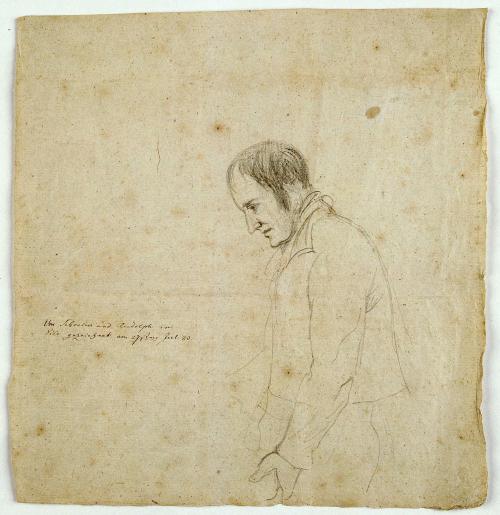
Da ich ein Knabe war…
Da ich ein Knabe war,
Rettet′ ein Gott mich oft
Vom Geschrei und der Ruthe der Menschen,
Da spielt′ ich sicher und gut
Mit den Blumen des Hains,
Und die Lüftchen des Himmels
Spielten mit mir.
Und wie du das Herz
Der Pflanzen erfreust,
Wenn sie entgegen dir
Die zarten Arme streken,
So hast du mein Herz erfreut
Vater Helios! und, wie Endymion,
War ich dein Liebling,
Heilige Luna!
Oh all ihr treuen
Freundlichen Götter!
Daß ihr wüßtet,
Wie euch meine Seele geliebt!
Zwar damals rieff ich noch nicht
Euch mit Nahmen, auch ihr
Nanntet mich nie, wie die Menschen sich nennen
Als kennten sie sich.
Doch kannt′ ich euch besser,
Als ich je die Menschen gekannt,
Ich verstand die Stille des Aethers
Der Menschen Worte verstand ich nie.
Mich erzog der Wohllaut
Des säuselnden Hains
Und lieben lernt′ ich
Unter den Blumen.
Im Arme der Götter wuchs ich groß.
Friedrich Hölderlin
(1770 – 1843)
Da ich ein Knabe war…
Gedicht
•fleursdumal.nl magazine
More in: Archive G-H, Archive G-H, Hölderlin, Friedrich

Grabgesang
Vor des Friedhofs dunkler Pforte
Bleiben Leid und Schmerzen stehn,
Dringen nicht zum heil’gen Orte,
Wo die sel’gen Geister gehn,
Wo nach heißer Tage Glut
Unser Freund in Frieden ruht.
Zu des Himmels Wolkentoren
Schwang die Seele sich hinan,
Fern von Schmerzen, neu geboren,
Geht sie auf — die Sternenbahn;
Auch vor jenen heil’gen Höhn
Bleiben Leid und Schmerzen stehn.
Sehnsucht gießet ihre Zähren
Auf den Hügel, wo er ruht;
Doch ein Hauch aus jenen Sphären
Füllt das Herz mit neuem Mut;
Nicht zur Gruft hinab — hinan,
Aufwärts ging des Freundes Bahn.
Drum auf des Gesanges Schwingen
Steigen wir zu ihm empor,
Unsre Trauertöne dringen
Aufwärts zu der Sel’gen Chor,
Tragen ihm in stille Ruh’
Unsre letzten Grüße zu.
Wilhelm Hauff
(1802 – 1827)
Grabgesang, Gedicht
• fleursdumal.nl magazine
More in: Archive G-H, Archive G-H, Galerie des Morts, Hauff, Hauff, Wilhelm, Tales of Mystery & Imagination
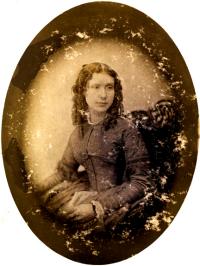
Madeline. A Legend Of The Mohawk
Where the waters of the Mohawk
Through a quiet valley glide,
From the brown church to her dwelling
She that morning passed a bride.
In the mild light of October
Beautiful the forest stood,
As the temple on Mount Zion
When God filled its solitude.
Very quietly the red leaves,
On the languid zephyr’s breath,
Fluttered to the mossy hillocks
Where their sisters slept in death:
And the white mist of the Autumn
Hung o’er mountain-top and dale,
Soft and filmy, as the foldings
Of the passing bridal veil.
From the field of Saratoga
At the last night’s eventide,
Rode the groom, – a gallant soldier
Flushed with victory and pride,
Seeking, as a priceless guerdon
From the dark-eyed Madeline,
Leave to lead her to the altar
When the morrow’s sun should shine.
All the children of the village,
Decked with garland’s white and red,
All the young men and the maidens,
Had been forth to see her wed;
And the aged people, seated
In the doorways ‘neath the vine,
Thought of their own youth and blessed her,
As she left the house divine.
Pale she was, but very lovely,
With a brow so calm and fair,
When she passed, the benediction
Seemed still falling on the air.
Strangers whispered they had never
Seen who could with her compare,
And the maidens looked with envy
On her wealth of raven hair.
In the glen beside the river
In the shadow of the wood,
With wide-open doors for welcome
Gamble-roofed the cottage stood;
Where the festal board was waiting,
For the bridal guests prepared,
Laden with a feast, the humblest
In the little village shared.
Every hour was winged with gladness
While the sun went down the west,
Till the chiming of the church-bell
Told to all the hour for rest:
Then the merry guests departed,
Some a camp’s rude couch to bide,
Some to bright homes, – each invoking
Blessings on the gentle bride.
Tranquilly the morning sunbeam
Over field and hamlet stole,
Wove a glory round each red leaf,
Then effaced the Frost-king’s scroll:
Eyes responded to its greeting
As a lake’s still waters shine,
Young hearts bounded, – and a gay group
Sought the home of Madeline.
Bird-like voices ‘neath the casement
Chanted in the hazy air,
A sweet orison for wakening, –
Half thanksgiving and half prayer.
But no white hand drew the curtain
From the vine-clad panes before,
No light form, with buoyant footstep,
Hastened to fling wide the door.
Moments numbered hours in passing
‘Mid that silence, till a fear
Of some unseen ill crept slowly
Through the trembling minstrels near,
Then with many a dark foreboding,
They, the threshold hastened o’er,
Paused not where a stain of crimson
Curdled on the oaken floor;
But sought out the bridal chamber.
God in Heaven! could it be
Madeline who knelt before them
In that trance of agony?
Cold, inanimate beside her,
By the ruthless Cow-boys slain
In the night-time whilst defenceless,
He she loved so well was lain;
O’er her bridal dress were scattered,
Stains of fearful, fearful dye,
And the soul’s light beamed no longer
From her tearless, vacant eye.
Round her slight form hung the tresses
Braided oft with pride and care,
Silvered by that night of madness
With its anguish and despair.
She lived on to see the roses
Of another summer wane,
But the light of reason never
Shone in her sweet eyes again.
Once where blue and sparkling waters
Through a quiet valley run,
Fertilizing field and garden,
Wandered I at set of sun;
Twilight as a silver shadow
O’er the softened landscape lay,
When amid a straggling village
Paused I in my rambling way.
Plain and brown the church before me
In the little graveyard stood,
And the laborer’s axe resounded
Faintly, from the neighboring wood.
Through the low, half-open wicket
Deeply worn, a pathway led:
Silently I paced its windings
Till I stood among the dead.
Passing by the grave memorials
Of departed worth and fame,
Long I paused before a record
That no pomp of words could claim:
Simple was the slab and lowly,
Shaded by a fragrant vine,
And the single name recorded,
Plainly writ, was “Madeline.”
But beneath it through the clusters
Of the jessamine I read,
“Spes,” engraved in bolder letters, –
This was all the marble said.
Mary Gardiner Horsford
(1824-1855)
Madeline. A Legend Of The Mohawk
•fleursdumal.nl magazine
More in: Archive G-H, Archive G-H, CLASSIC POETRY, Western Fiction

The Poet’s Lesson
There came a voice from the realm of thought,
And my spirit bowed to hear,–
A voice with majestic sadness fraught,
By the grace of God most clear.
A mighty tone from the solemn Past,
Outliving the Poet-lyre,
Borne down on the rush of Time’s fitful blast.
Like the cloven tongues of fire.
Wouldst thou fashion the song, O! Poet-heart,
For a mission high and free?
The drama of Life, in its every part,
Must a living poem be.
Wouldst thou speed the knight to the battle-field,
In a proven suit of mail?
On the world’s highway, with Faith’s broad shield,
The peril go forth to hail.
For the noble soul, there is noble strife,
And the sons of earth attain,
Through the wild turmoil and storm of Life,
To discipline, through pain.
Think not that Poesy liveth alone,
In the flow of measured rhyme;
The noble deed with a mightier tone
Shall sound through latest time.
Then poems two, at each upward flight,
In glorious measure fill;
Be the Poem in words, one of beauty and might,
But the Life one, loftier still.
Mary Gardiner Horsford
(1824-1855)
The Poet’s Lesson.
• fleursdumal.nl magazine
More in: Archive G-H, Archive G-H, CLASSIC POETRY
 During the Revolutionary war, a young American lady was murdered, while dressed in her bridal robe, by a party of Indians, sent by her betrothed to conduct her to the village where he was encamped.
During the Revolutionary war, a young American lady was murdered, while dressed in her bridal robe, by a party of Indians, sent by her betrothed to conduct her to the village where he was encamped.
After the deed was done, they carried her long hair to her lover, who, urged by a frantic despair, hurried to the spot to assure himself of the truth of the tale, and shortly after threw himself, in battle, on the swords of his countrymen.
After this event, the Indians were never successful in their warfare, the spectre of their victim presenting itself continually between them and the enemy.
The Phantom Bride. – Indian Legends
The worn bird of Freedom had furled o’er our land
The shattered wings, pierced by the despot’s rude hand,
And stout hearts were vowing, ‘mid havoc and strife,
To Liberty, fortune, fame, honor, and life.
The red light of Morning had scarcely betrayed
The sweet summer blossoms that slept in the glade,
When a horseman rode forth from his camp in the wood,
And paused where a cottage in loneliness stood.
The ruthless marauder preceded him there,
For the green vines were torn from the trellis-work fair,
The flowers in the garden all hoof-trodden lay,
And the rafters were black with the smoke of the fray:
But the desolate building he heeded not long,
Was it echo, the wind, or the notes of a song?
One moment for doubt, and he stood by the side
Of the dark-eyed young maiden, his long-promised bride.
Few and short were their words, for the camp of the foe
Was but severed from them, by a stream’s narrow flow,
And her fair cheek grew pale at the forest bird’s start,
But he said, as he mounted his steed to depart,
“Nay, fear not, but trust to the chief for thy guide,
And the light of the morrow shall see thee my bride.”
Why faltered the words ere the sentence was o’er?
Why trembled each heart like the surf on the shore?
In a marvellous legend of old it is said,
That the cross where the Holy One suffered and bled
Was built of the aspen, whose pale silver leaf,
Has ever more quivered with horror and grief;
And e’er since the hour, when thy pinion of light
Was sullied in Eden, and doomed, through a night
Of Sin and of Sorrow, to struggle above,
Hast thou been a trembler, O beautiful Love!
‘T was the deep hush of midnight; the stars from the sky
Looked down with the glance of a seraph’s bright eye,
When it cleaveth in vision from Deity’s shrine
Through infinite space and creation divine,
As the maiden came forth for her bridal arrayed,
And was led by the red men through forest and shade,
Till they paused where a fountain gushed clear in its play,
And the tall pines rose dark and sublime o’er their way.
Alas for the visions that, joyous and pure,
Wove a vista of light through the Future’s obscure!
Contention waxed fierce ‘neath the evergreen boughs,
And the braves of the chieftain were false to his vows;
In vain knelt the Pale-Face to merciless wrath,
The tomahawk gleamed on her desolate path,
One prayer for her lover, one look towards the sky,
And the dark hand of Death closed the love-speaking eye.
They covered with dry leaves the cold corpse and fair,
And bore the long tresses of soft, golden hair,
In silence and fear, through the dense forest wide,
To the home that the lover had made for his bride.
He knew by their waving those tresses of gold,
Now damp with the life-blood that darkened each fold,
And, mounting his steed, pausing never for breath
Sought the spot where the huge trees stood sentries of Death;
Tore wildly the leaves from the loved form away,
And kissed the pale lips of inanimate clay.
But hark! through the green wood what sounded afar,
‘T was the trumpet’s loud peal–the alarum of war!
Again on his charger, through forest, o’er plain,
The soldier rode swift to his ranks ‘mid the slain:
They faltered, they wavered, half turning to fly
As their leader dashed frantic and fearlessly by,
The damp turf grew crimson wherever he trod,
Where his sword was uplifted a soul went to God.
But that brave arm alone might not conquer in strife,
The madness of grief was conflicting with Life;
His steed fell beneath him, the death-shot whizzed by,
And he rushed on the swords of the victors to die.
‘Neath the murmuring pine trees they laid side by side,
The gallant young soldier, the fair, murdered bride:
And never again from that traitorous night,
The red man dared stand in the battle’s fierce storm,
For ever before him a phantom of light,
Rose up in the white maiden’s beautiful form;
And when he would rush on the foe from his lair,
Those locks of pale gold floated past on the air.
Mary Gardiner Horsford
(1824-1855)
The Phantom Bride. – Indian Legends
• fleursdumal.nl magazine
More in: Archive G-H, Archive G-H, CLASSIC POETRY, Western Fiction
Thank you for reading Fleurs du Mal - magazine for art & literature